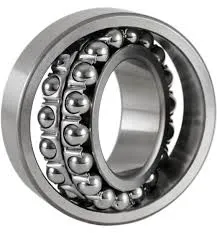
Dec . 03, 2024 17:28 Back to list
four row cylindrical roller bearing
Understanding Four-Row Cylindrical Roller Bearings
Four-row cylindrical roller bearings are critical components widely used in various industrial applications, particularly in heavy machinery and equipment. These bearings are known for their ability to support high radial loads and provide reliability in high-speed operations. This article explores the design, functionality, advantages, and applications of four-row cylindrical roller bearings.
Design and Structure
Four-row cylindrical roller bearings consist of four rows of cylindrical rollers that are arranged parallel to each other. The design includes an outer ring, an inner ring, and multiple cages that guide the rollers. The rollers are typically designed with a large diameter to enhance load-carrying capacity while minimizing the overall size of the bearing.
The arrangement of the rollers enables these bearings to handle substantial radial loads, making them advantageous in applications subject to heavy forces. The assembly is often held together by a tight tolerance between the rollers and the raceways, which helps to reduce wear and extend the lifetime of the bearing.
Functionality
One of the primary functions of four-row cylindrical roller bearings is to reduce friction between moving parts and facilitate smooth rotation. The cylindrical shape of the rollers allows for optimal distribution of the load over a larger contact area, thus improving performance and durability.
Additionally, these bearings are designed to accommodate axial displacement, which enables them to operate effectively in demanding environments where shaft misalignment or thermal expansion might occur.
The sophisticated design of four-row cylindrical roller bearings can also allow for the incorporation of lubrication systems that keep the rollers and raceways adequately lubricated, further enhancing performance and reducing wear.
Advantages
The use of four-row cylindrical roller bearings comes with various advantages
four row cylindrical roller bearing

2. Stability and Durability The robust structure provides stability and durability, allowing for consistent performance over extended periods and in harsh conditions.
3. Reduced Friction Improved lubrication and an optimized design help to minimize friction, leading to lower energy consumption and less heat generation during operation.
4. Versatile Applications Four-row cylindrical roller bearings are versatile and can be used in various industries, including construction, mining, and manufacturing.
5. Resistance to Misalignment These bearings can accommodate misalignment due to thermal expansion or other factors, which is critical in applications where precision is necessary.
Applications
Four-row cylindrical roller bearings are particularly prevalent in several high-load and high-speed applications
- Turbines Used in power generation systems, they provide reliable performance under extreme conditions. - Rolling Mills Essential for the steel production and metal rolling industries, they handle the high radial loads generated during the rolling process. - Marine Applications Employed in the drivetrain of large vessels where heavy loads and reliability are critical. - Construction Machinery Utilized in excavators, cranes, and other heavy equipment, these bearings ensure smooth operation and high durability.
Conclusion
In conclusion, four-row cylindrical roller bearings play an indispensable role in various industrial applications, offering high load capacity, durability, and reliability. Their design caters to the demands of heavy machinery, making them an essential component for organizations that rely on efficient and effective operation of equipment. Understanding the characteristics and advantages of these bearings can lead to informed decisions when selecting components for engineering projects and maintenance, ultimately enhancing the performance and lifespan of machinery. With technological advancements continuing to improve their design and functionality, the importance of four-row cylindrical roller bearings in modern industries will undoubtedly grow.
Latest news
-
Premium Deep Groove Ball Bearings | High Speed & Reliability
NewsAug.29,2025
-
Durable Scaffolding Clamps - Secure & Reliable Tube Connectors
NewsAug.28,2025
-
Common Failures in Thrust Ball Bearings and Solutions
NewsAug.22,2025
-
How Tapered Roller Bearings Can Take Shock Loads
NewsAug.22,2025
-
Angular Bearings in High-Precision Spindles
NewsAug.22,2025
-
The Impact of Misalignment on Cylindrical Roller Bearing Performance
NewsAug.22,2025
